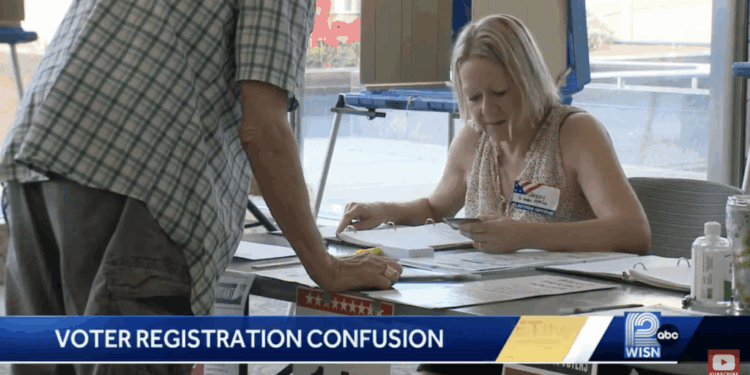Voter turnout in Wisconsin’s nationally-watched Supreme Court election last April broke records for a Badger State spring election not featuring a presidential primary. In Milwaukee, election administrators reportedly had to print additional ballots on Election Day to keep up with demand. Milwaukee Election Commission Executive Director Paulina Gutiérrez told the Milwaukee Journal Sentinel that there was “historic turnout in the spring election” the likes of which the city had never seen.
The record numbers got a big boost from Election Day Registrations (EDRs). A Milwaukee elections official told The Federalist that 5,813 people registered to vote on the day of the April 1 election. That’s a nearly 63 percent increase in same-day voters compared to the 2023 spring election featuring a statewide Supreme Court race, according to the Milwaukee Election Commission.
It should be noted that these were no run-of-the-mill spring elections. In both the 2023 and 2025 contests, ideological control of Wisconsin’s court of last resort was up for grabs. In 2023, far-left Supreme Court candidate Janet Protasiewicz crushed former Justice Daniel Kelly by 11 percentage points to put liberals back in the majority for the first time in 15 years. In this year’s spring election, leftist Dane County Judge Susan Crawford crushed former Wisconsin Attorney General Brad Schimel, a Republican, by 10 percentage points, giving liberals control of the court for the foreseeable future.
Both races were marked not only by massive turnout for spring elections, but historic campaign spending. This past spring’s Supreme Court race racked up more than $100 million in spending, a record for any U.S. judicial race, supplanting the previous $50.1 million record holder, the 2023 Wisconsin Supreme Court contest.
Statewide, election day registrations totaled 51,942, according to the Wisconsin Elections Commission. That’s a significant number of same-day voters to vet in such a short period of time, leading to understandable election integrity concerns. And that’s the problem. While leftist voting activists say same-day registration bolsters voter turnout, election integrity advocates argue the allowance opens the door to election administration chaos and fraud. The problem is more pronounced when elections officials aren’t doing their jobs, or even following the law.
‘Basic Election Integrity Safeguard’
Wisconsin is one of 23 states and the District of Columbia that allow voters to register on election day, according to the National Conference on State Legislatures. The Badger State has done so since 1976.
Records show that several local elections offices have had trouble following state election law on verification of same-day registrants, inactivating registrants that can’t be verified, and referring suspected fraudulent voters to district attorneys for investigation. That includes one notorious city clerk who has been reprimanded by Wisconsin’s election regulator for failing to do her job.
The Public Interest Legal Foundation (PILF) has notified 31 jurisdictions in Wisconsin that have failed to follow the law. Scofflaws, according to records obtained PILF, range from the Badger State’s smallest towns to its bigger cities.
All of these jurisdictions, according to the Wisconsin Elections Commission’s October records, have failed to perform required voter list maintenance more than six months after the spring election.
“If an EDR audit postcard is returned as undeliverable, Wisconsin Statute § 6.56(3) requires municipal clerks to inactivate the voter record, mail the voter a notice of change of status, and notify the District Attorney and the Elections Commission,” a PILF summary of the law states.
“This is a basic election integrity safeguard required by state law. Ignorance is not an excuse,” said Douglas Blair, PILF’s director of communications, in a statement to The Federalist.
‘Out of Compliance’
In some cases, local election clerks didn’t seem familiar with the portion of the state’s voter roll maintenance law, a Federalist review found. In other instances, clerks blamed oversights, miscommunication or staff changes. One clerk said she couldn’t comment on an ongoing investigation into the matter, while others, including a repeat offender, failed to return The Federalist’s requests for comment.
Blair said some of the elections officials have updated their records after completing the required steps in the maintenance process.
The election integrity watchdog’s letters remind the clerks that, after each election, the Wisconsin Elections Commission is required to send first-class mail postcards to all election day registrants “to audit the residential contact information collected in the polls.” Undeliverable mail is forwarded to municipal election officers, who are required to change the status of the voter from eligible to ineligible on the registration list, mail the elector a notice of the change in status, and provide the name to the local DA. Audits were supposed to be completed and reports filed with the Elections Commission in June.
“Current WEC data indicate you are admittedly out of compliance with the mandatory audit process,” warns the foundation’s letter to Laurie Decker, clerk of Little Chute, a village of nearly 12,000 people east of Appleton.
Decker’s office reported to the Elections Commission that it registered 96 people on election day, with 71 of those returned as “undeliverable.” Zero of those registrants were marked inactive, and zero were referred for further review.
Decker acknowledged her office was not in compliance. The clerk told The Federalist that she has looked into the matter and said it was an “administrative error” on her part. She said her deputy clerk, who usually handles the election day registration reports, resigned shortly after the April election and the postcards were “intertwined” with other list maintenance cards. Decker, who is looking forward to her retirement after 12 years leading Little Chute’s election administration, said it was an oversight that is being remedied.
In the Kenosha County Town of Wheatland, verification postcards to all 14 same-day registrants came back as undeliverable. None has been designated ineligible, nor have there been any referrals to the county’s top prosecutor. Clerk Katie Sweatman told The Federalist she is aware of the problem and has begun an investigation to determine what happened. She said she could not comment on the ongoing investigation.
Kenosha, one of Wisconsin’s largest cities, reported 613 election day registrations, of which 14 were returned as undeliverable. Admittedly, it’s a much smaller percentage than the undeliverables reported in other Wisconsin jurisdictions, but the issue remains the same: zero inactivations and zero referrals. Kenosha election officials did not return The Federalist’s request for comment.
Neither did officials in Wisconsin’s third-largest city, Green Bay. The clerk’s office recorded 850 same-day registrations on election day in April, with 35 verification cards returned undeliverable. Green Bay has been down this road before.
Pleading Ignorance
Just before November’s presidential election, the Wisconsin Elections Commission found that Green Bay Clerk Celestine Jeffreys violated the law or abused her discretion when she failed to follow the voter list maintenance procedures. As The Federalist reported, a voter complaint alleged the clerk failed to comply with the auditing requirements in multiple elections held in 2020, 2021, 2022, and 2023. The commission agreed.
Jeffreys, a pivotal player in the Zuckerbucks scandal of 2020, was ordered to take “affirmative steps” to comply with the law as well as the commission’s updated Election Day Registration postcard guidance issued in February 2023. She head to certify to the commission that she has completed the steps required under law “at the earliest time practicable after the November 5, 2024 election, but no later than Monday, February 3, 2025.”
Jeffreys has pleaded ignorance in the past.
“Clerk Jeffreys admits that she has not been strictly adhering to the statutory requirements in Wis. Stat. § 6.56 during the elections alleged. She claims that her failure to do so was inadvertent and due to a lack of awareness of the statutory requirements, and not the result of any willful violation of state law,” the WEC document states.
Jeffreys and her office have had other issues with election law in recent years,
“Ignorance is not an excuse. Especially in Green Bay, which should know better given we covered this exact issue with them last year,” Blair of the Public Interest Legal Foundation said.
‘The Fear’
Bob Spindell, a Republican-appointed member of the Wisconsin Elections Commission, said the lapse in following state voter list maintenance law raises serious election integrity concerns. In an interview with The Federalist, Spindell said the commission will be looking into noncompliance issues.
“That’s an interesting area that it appears we have not spent enough time on enforcing,” the commissioner said. “That’s always been the fear of having same-day voter registration in Wisconsin.”
It’s a concern in all of the states that allow same-day voter registration. As the America First Policy Institute noted in a report last year, the hasty practice of same-day registration eliminates “comprehensive voter identification verification.”
“Without the time necessary to check if a voter actually lives within the district in which that person is voting, there is no way to be certain that fraudulent votes are not being cast,” Anna Pingel, the institute’s Elections Campaign Manager, wrote in the report titled, “The Pitfalls of Same-Day Registration. “Once elections are certified, which, at most, happens only a few weeks after the election, votes cannot be discarded or marked as fraudulent.”
The report cites North Carolina’s same-day registration debacle in the 2008 election. Asked to provide input on their experiences, elections officials in several North Carolina counties gave the State Board of Elections an earful. One county noted “numerous undeliverable voter registration cards returned after the canvass timeframe, which allowed the voter’s vote to count and it should not have.”
“This means that the county could not verify the voter’s address and, therefore, the voter’s eligibility, yet these votes were counted due to SDR,” the “Pitfalls” report states. “The subsequent report issued by the Board of Elections reluctantly noted that multiple county boards were in the same situation of having counted ballots cast by voters whose eligibility could not be verified.”
‘Enforce the Law’
Same-day voter registration proponents like to push aside such concerns and stress the potential bump in turnout it can bring, although perhaps not in the way the left hopes it will.
Spindell said he knows some Wisconsin clerks don’t make the undeliverables provision a priority.
“They are supposed to make a reasonable effort to see what the situation is,” the elections commissioner said. “It’s really up to them whether they are going to check it out.”
There is, however, a “reasonable doubt” provision in the law that adds a broader burden to the process.
“After you investigate an undeliverable postcard, unless you believe beyond a reasonable doubt that the individual does not qualify as an elector or is not properly registered, the WEC recommends that you not refer such cases to the district attorney,” the memo advises.
Is it possible that overworked clerks and election administrators have been reluctant to add to their workload deep investigation into suspect same-day registrations? Absolutely.
But the Elections Commission is ultimately responsible for enforcement of the law. Blair said the regulator is not holding up its end of the obligation.
“WEC needs to get off their butts. They need to actually enforce state law,” the Public Interest Legal Foundation spokesman said. “If they don’t do so, outside groups like PILF will be forced to litigate.”
Matt Kittle is a senior elections correspondent for The Federalist. An award-winning investigative reporter and 30-year veteran of print, broadcast, and online journalism, Kittle previously served as the executive director of Empower Wisconsin.
















